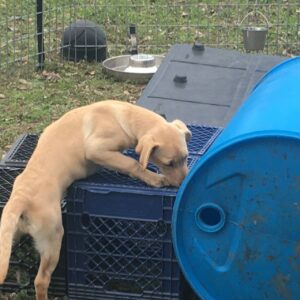
I have been a passionate dog sports person for 36 years. I started in Schutzhund and have started a half dozen clubs across the nation as it evolved into its present state. Clubs are a relaxed environment that allow for a lot of observation of the dog/handler team across different disciplines (Tracking, Obedience, and Protection). We trained a few days in a row over the holiday and I noticed how bad handlers can be at playing with their dogs. Too often the goal is control, which lies at the opposite side of the spectrum of play.
Play is defined in Animal Play by Beckoff and Byers as “all motor activity performed postnatally that appears (our emphasis) to be purposeless, in which motor patterns from other contexts may often be used in a modified forms and altered temporal sequencing.” The authors add that defining play is very difficult. Jaak Panksepp says play is “spontaneous neural urges within the brain.” Domestic animals tend to hold on to play longer through their development than do wild animals.
Play is a tremendous tool because it is both high arousal and highly motivating. More importantly, it is self motivating and works well in tandem with self discovery and self reward. The thing that kills play is when the complexity of the rules make it more like repetitive work. A handler with too many goals and rules quickly diminishes the self reward of play. My rule of thumb is that you start with a young dog where it is 90% free form play and only a 10% smidgen of performed behavior. With that ratio they will not even realize that some training is occurring. The human ego sees the shaping of new behavior and too quickly makes it more performed behavior than play and the dogs quickly lose the self motivation of play. Make the change so gradually that performed behavior becomes elaborate play. Even a trial-ready dog is still seeking play (90% work/10%play), but has become accustomed to a game with more rules and is conditioned slowly to the random reinforcement of play used among other reinforcers.
You would rarely play Monopoly with a four year old child. My four year old grand daughter always wants to play Mouse Trap, but she loses interest in other peoples’ turns and use of strategy. Once we finish the game she just wants to trap the mouse, ala the Rube Goldberg contraption, and will do that on her own over and over again. Keep your dog engaged in play, be willing to be silly, and engage more like another puppy than as a dominant/controlling human being. Keeping it simple and fun will give you a dog that will always look forward to play and with good development, a dog that matures into very complex play.

